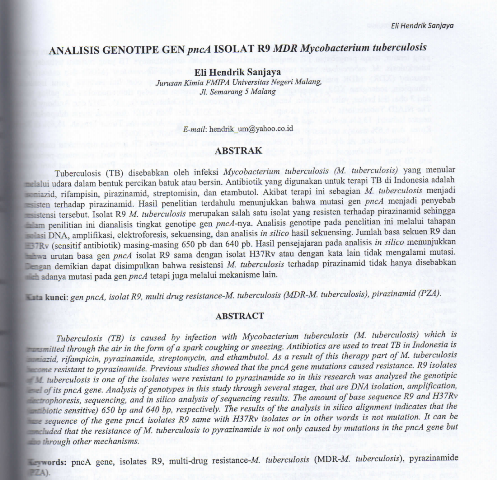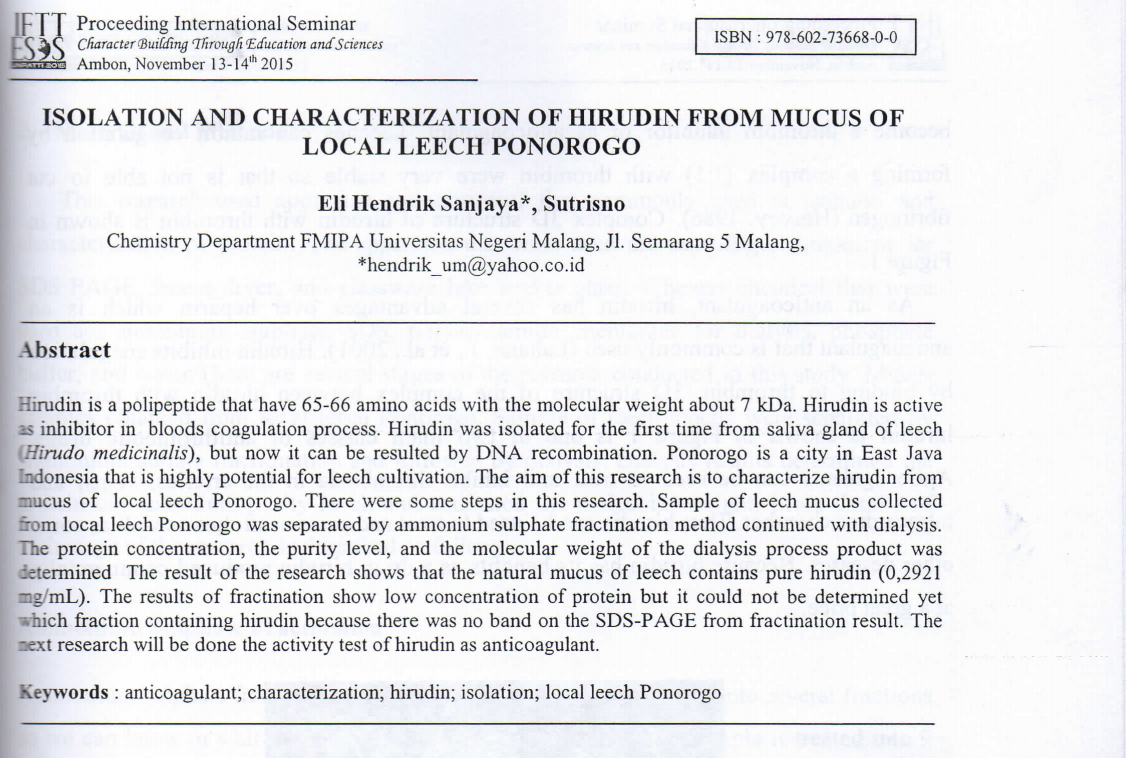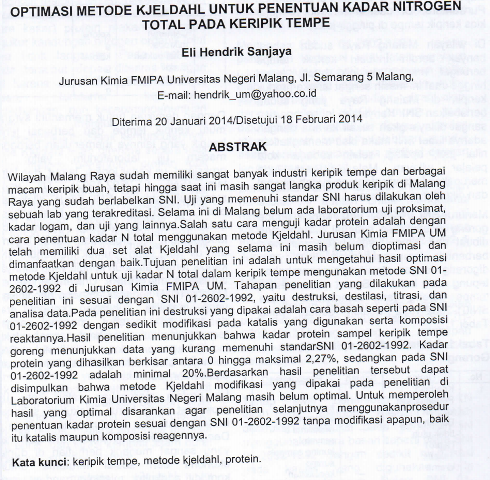Prosiding SNKP KIMIA UM-Analisis Genotipe Gen pncA Isolat R19 MDR Mtb a.n Eli Hendrik Sanjaya




ANALISIS KESALAHAN ATURAN GAUSS LEGENDRE
(Suatu Pendekatan Integral Numerik)
SALMET
Pengitegralan numerik pada dasarnya adalah penentuan nilai hampiran dari integral tentu dari fungsi f(x) pada selang tutup [a,b]. Dalam tulisan ini akan dibahas adalah aturan Gauss Legendre dan juga akan diuraikan tentang “Kesalahan” dari aturan Gauss Lgendre yang bertujuan untuk mengamati ketelitian dari aturan tersebut.
Kata-kata kunci: Pengintegralan numerik, aturan Gauss Legendre, analasis kesalahan.
STAGE OF CRITICAL THINKING ABILITIES IN SOLVING
MATHEMATICAL PROBLEMS FOR PROSPECTIVE TEACHERS
DEPARTEMENT OF MATHEMATICS FMIPA UM MALANG
Slamet
Department of Mathematics FMIPA UM Malang
Students S3 Mathematics Education Doctoral Program UM
E-mail: slamet1162@gmail.com
Abstract
Critical thinking is a way for someone to improve the quality of the ideas using techniques
systematization way of thinking and intellectual thinking in generating ideas initiated. The level of critical
thinking abilities of each person is different and the differences in learning mathematics can be seen as a
level that starts from the lowest level to the highest level. But in reality, research related to stage of
critical thinking for assessment in mathematics instruction are valid and reliable, has not been developed
by mathematics education experts. Thus, this research seeks to formulate stage of critical thinking
abilities in solving mathematical problems. Stages of development of critical thinking start from the
lowest are: unreflective thinking, challenged thinking, beginning thinking, practicing thinking, advanced
thinking and master thinking. Critical thinking which will be observed and studied are the elements of
reasoning: purpose, questions, asumptions, point of view, information, concepts and ideas,interpretations
and implications by using a standard of intellectual reasoning which include: clarity, accuracy, precision,
relevance, consistency, significance, logicalness, depth, breadth and fairness. This stage, that related with
critical thinking abilities, describes thinking strategies generally, not only in mathematics. The developed
level provide evidence of the degree of hierarchical (sequential) in critical thinking. This research is a
qualitative research aimed to formulate stage of critical thinking abilitiess in solving mathematical
problems are valid and reliable, find and identify the characteristics of students’ critical thinking stage for
each of these levels. The research’s subjects were prospective teachers of Mathematics Department, State
University of Malang, using the snowball method. Steps of research stage of critical thinking abilitiess,
the steps as follows: formulate initial theory about the level of critical thinking abilities based on the study
of theory supported by empirical data, draft Validating theories about the level of critical thinking
abilities in an expert to determine the validity and construct a theory developed, doing pre-research to
prove the existence of the level of critical thinking abilities, revise draft theory about the level of critical
thinking abilities, Perform data collection to determine the existence of the level of critical thinking
abilities, Perform data analysis. Researchers initially formulating the criteria of critical thinking abilities
are theoretically that consists of 5 levels starting from the lowest levels: level 0 (not critical), level 1 (less
critical), level 2 (critical enough), level 3 (critical) and level 4 (very critical). For the lowest level, which
is unreflective thinking (thinking that is not reflected) can be compared with the level 0 (not critical),
challenged thinking (thinking that challenged) can be compared with the level 1 (less critical), beginning
thinking (thinking starters) can be compared with level 2 (critical enough), practicing thinking (thinking
exercises) and advanced thinking can be compared with the level 3 (critical), as well as a master’s
thinking can be compared with the level 4 (very critical).
Key words: stage of critical thinking, critical thinking criteria, elements of reasoning, intellectual
standards of reasoning, and mathematical problem solving.